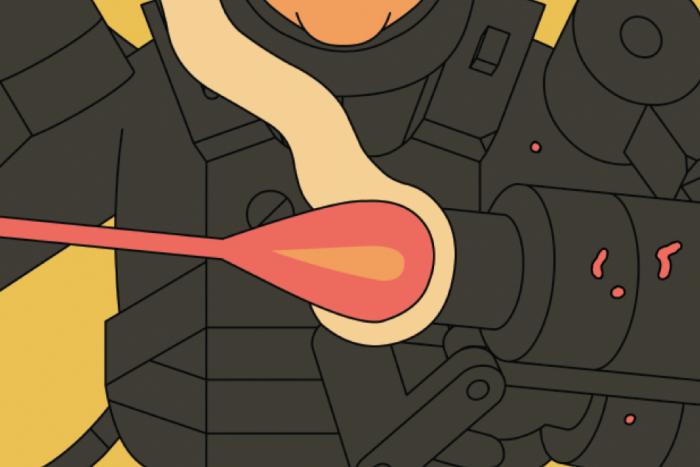
Illustration by Cameron Nicholson
What's in a face? This week, we invited ten writers to take part in a statuette-free celebration of what draws us to the people we can't stop watching. Read the whole series here.
Chris Rock used to look like a daggone hillbilly. His words, not mine. Until he replaced his fucked up teeth with a set rumored to have been funded in part by his role in Lethal Weapon 4—which, ironically, counts a scene in a dentist’s office among its most memorable—he walked around with something like a barbed grill in his mouth. "I was on Oprah Winfrey with horrible teeth. You should have pulled me to the side," he told Winfrey back in 2002. He was joking, kind of, but mostly he wasn’t. The teeth had to go.
When he got them sometime in the late ‘90s, the new teeth, pearly and straight, did that thing good teeth do: they freed the rest of his face to be itself, letting other imperfections try their hand at first-string. Now, you’re more likely to notice other things about Chris Rock: the way his eyes dart around a room looking for approval in the form of laughs; the way he nods his head enthusiastically after every punchline; the way his high, supermodel cheekbones make him look like he’s smiling even when he’s doing precisely the opposite; the way his face manages to squeeze and stretch at the same damn time, pulling inwards and disappearing his eyes behind folds of skin.
Aside from the teeth, though, it’s the same face he's always had—a lot to say for someone who has done years of aging in public. Over the three decades his career has spanned, as he has moved fluidly from comic to actor to producer, back to comic and actor and then screenwriter and director, little has changed about Chris Rock’s features other than an occasional new configuration of facial hair—never a full beard, but always a mustache—and the waning and waxing ‘fro that rarely extends beyond a couple of centimetres.
In the last handful of years, he has gradually built distance from the awkward, skinny, high-pitched weirdo of yore, settling more comfortably into his biology like a teenager hitting puberty a couple of decades late. A black actor without the facial symmetry and sexual energy of Denzel or the family-friendly charm of Will Smith, he was destined, in Hollywood, anyway, to be a sidekick. But as demographics change and chip away at long-standing industry structures, a confident, broader-chested Chris Rock has shown up ready for more screen time, eager to be taken seriously as an actor and a legitimate love interest. His role opposite Rosario Dawson in last year’s Top Five may have been the first time the idea of a Chris Rock sex scene was believable and even almost pleasant.
At 50, when many of his peers may be starting to age out of certain roles, he is finally becoming the leading man he never was in his youth. The middle-aged weight gain that’s a pest for others has, by something akin to a genetic lottery, worked in his favor; Chris Rock keeps getting more and more handsome. His face is fuller, his eyes sparkle with kindness, his greys carry the wisdom of a life lived. He is living proof that, as he would likely tell you himself, black don’t crack.






